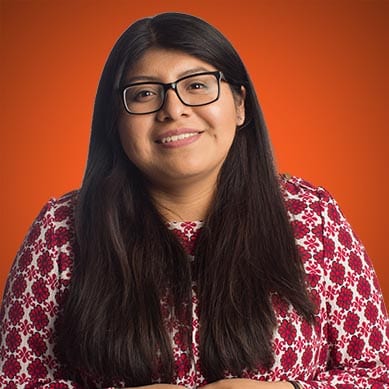Samantha Perez is a PhD student in Biomedical Engineering at the University of Virginia. She is part of the Health Policy Research Scholars Cohort 2017.
Before we begin, tell us a little bit about yourself and what your research interests are.
I was born in Los Angeles to parents who emigrated from Oaxaca, Mexico. I received a Bachelor of Science in Engineering degree in Biomedical Engineering from Duke University, with a concentration in molecular, cellular, and tissue engineering. I am currently at the University of Virginia pursuing a PhD in Biomedical Engineering. My research interest is in developing novel cancer therapeutics to decrease cancer health disparities. I am also broadly interested in elucidating and reducing bias in biomedical big data and precision medicine.
What’s the story behind why you’re doing what you’re doing?
Growing up, I was acutely aware of the inequalities in education, health, and accessibility that plagued my family and community. As I developed my research interests, I realized that increasing science dissemination and translation could help counteract these disparities. I decided to focus on advancing cancer research, not only because cancer had directly affected my family and friends but also because there was an unmet need for more effective treatments.
Tell us about a project you are currently working on that you are excited about?
My advisor has developed a pipeline to identify biomarkers, which are proteins that are preferentially expressed on the surface of diseased cells. My research focuses on characterizing the role of one such protein, cell surface plectin (CSP), which is exclusively localized to the cell surface of several carcinomas, including pancreatic and ovarian cancer. I am investigating how CSP affects a cancer cell’s signaling network, in order to develop novel diagnostic and treatment modalities. I am excited to work on this project, which has immense potential to directly impact cancer survival rates.
For people unfamiliar with your research area, what is one piece of information you think is important for them to know?
In 2019, more than 4,800 U.S. citizens will be diagnosed with cancer each day. By the end of the year, more than 600,000 loved ones and friends will die from cancer. In particular, pancreatic cancer is the 4th leading cause of cancer-related death, and patients with the most common form, pancreatic ductal adenocarcinoma, have only a 9 percent five-year survival rate. Similarly, ovarian cancer is the deadliest gynecologic cancer. While we have made great strides in cancer research and treatment, there is still an urgent need for more effective and equitable care. To make this a reality, we need constant science funding.
Who is a researcher you admire and why?
I admire how my advisor, Dr. Kimberly Kelly, has been able to make advances on several fronts—such as imaging, diagnostics, and therapeutics—for a variety of diseases. Every project she embarks on has a clear translation focus, and she aims to disseminate scientific findings so they can have a tangible impact on creating healthier communities. I also look up to Dr. Mete Civelek and Dr. Kristen Naegle‘s use of big data to gain biologic insights at both the protein and the gene level. Beyond research, all three mentors have actively worked to increase the diversity and retention of students pursuing biomedical engineering degrees.
How has being an HPRS Scholar helped you during your time as a doctoral candidate?
HPRS has been crucial to my development as a cancer researcher. The training provided in health policy translation, health equity, and population health has allowed me to critically analyze my research and better understand its potential unintended consequences. I have gained a greater appreciation of how basic science fits in the greater scheme of population health and health equity. Additionally, my ability to communicate my research has greatly improved as a result of our HPRS assignments, such as writing a policy memo, health impact assessment, and op-ed.
Above all, I have great appreciation for the vast network of scholars I have gained through HPRS. My cohort has been a constant source of support, inspiration, and strength.
In the RWJF HPRS program we have worked with you to help you think further about using your research to develop policy. If you could use your research to change any policy, what policy would it be?
My research falls under the umbrella of precision medicine—tailored care that accounts for a patient’s specific biology. Unfortunately, biomedical research often undersamples women and minority populations, thus limiting its generalization. I would like to work toward creating guidelines that require publicly funded research to collect and work with diverse study participants and datasets such as the All of Us project launched by the National Institutes of Health.
OK, here’s a fun question to wrap things up. If you could visit any place in the world, where would you choose to go and why?
I would spend an extended period of time exploring the different cultures and traditions of Oaxaca, Mexico. Although I have visited multiple times, I would like to immerse myself in learning how to make mole and speak Zapoteco, and to record my family’s history.
Thank you so much for your time!

